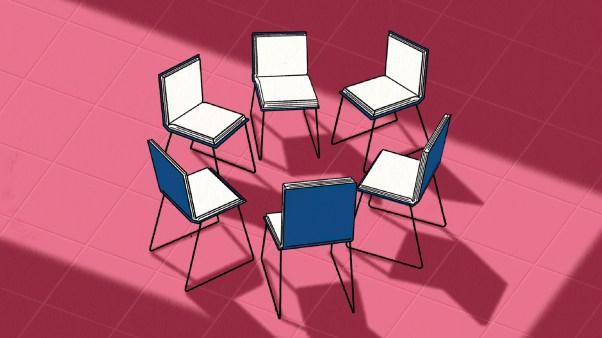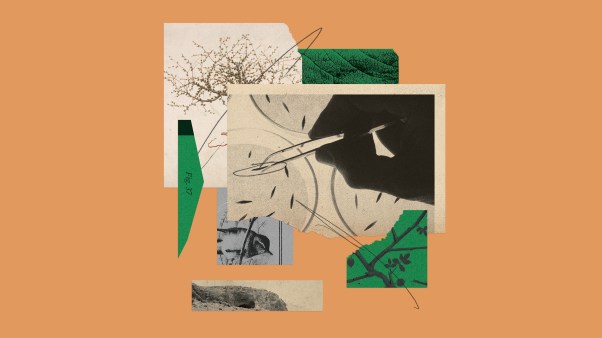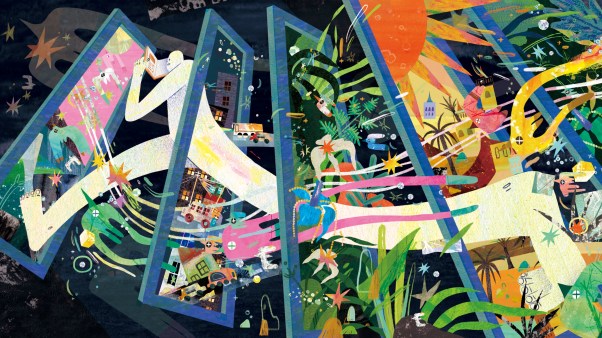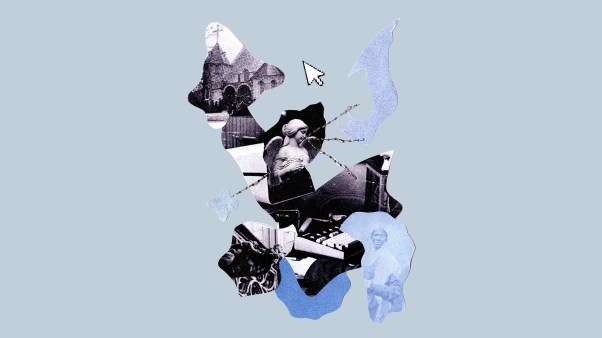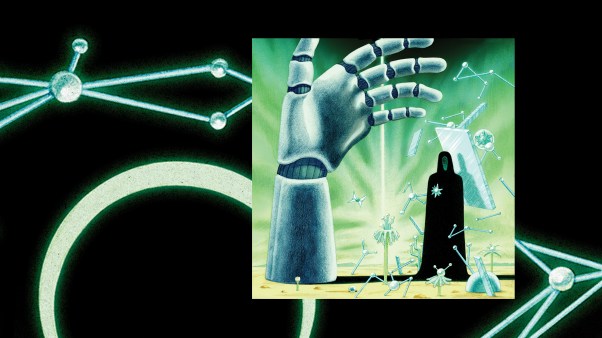On a recent episode of The Bulletin, Christianity Today’s senior director of CT Media, Mike Cosper, spoke with journalist Krista Tippett, who has covered religion and spirituality across traditions on her show On Being for more than 20 years. Their conversation touched on the fraught political climate in the US, the individualism corroding American culture, and how hope and community can offer a pathway to healing. This excerpt has been edited for clarity.
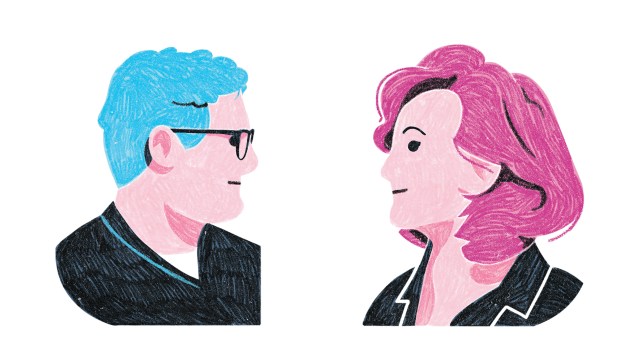 Illustration by Ronan Lynam
Illustration by Ronan LynamMike Cosper: What I have loved about your work for years now is that you have called us to pay attention to the spiritual undercurrents of our culture. What taught you to stop and pay attention to the spiritual elements of our world?
Krista Tippett: There are so many ways to answer, but I’ll just say that I grew up in a culture and a family where there wasn’t a lot of deep listening and attention.
Sometimes we learn to value things because it’s been modeled for us, and sometimes it’s because of an absence. And it’s a gift when you have this hole that you couldn’t articulate and then you realize what needs to fill it.
In terms of the spiritual aspect, I grew up Southern Baptist in a very religious world, but I’m not sure I would say it was a very spiritual world. When I left home, I was not really turning against religion, but I wasn’t sure what relevance it had for the world I was moving in at that point. Later on, I went to divinity school and I learned to love theology.
I got interested in politics and ended up spending most of my 20s in divided Berlin. The Cold War was the great geopolitical drama of the ’80s. It was years before I could have articulated it this way, but that place was a fault line of the geopolitical landscape at that time.
What I started to perceive was an absence of attention the spiritual dynamic of the division of the world and these weapons we had pointed at each other. In divided Berlin, you took one city with one people, one language, one culture and split it into two—and gave them two absolutely different competing realities that had missiles pointed at each other. And because I loved people who lived on both sides of that wall, I watched people create lives of dignity, beauty, meaning, and intimacy—or fail to do so.
And it wasn’t about which side of the wall they landed on. It was not the raw materials people were handed but what they did with those raw materials. That brought me back to this primal, original fact of “us.”
Spiritual is a word that I use lightly because it’s pretty vague. But yes, it was that spiritual aspect that the policymakers and the politicians and the people who were moving the missiles around on the map weren’t paying attention to.
I just got fascinated with the question “How do we pay attention both amid and despite what the official, serious ‘political economic world’ is doing around us?” And paying attention to that has served me pretty well, living in this time we inhabit.
MC: In your book Becoming Wise, you say, “Hope … is a choice that becomes a habit that becomes spiritual muscle memory.” And then you go on and describe it as a “renewable resource.” Can you unpack that for us and for this moment in particular?
KT: I think a lot about hope, and these days I mostly just leap and say, “Hope is a muscle.” And what I’m contrasting is, a muscle is different from wishful thinking and it’s different from assuming or believing that things will turn out all right in the end. The way I think about hope is reality-based. It’s not optimism.
I have some role models in this. I think about John Lewis, who talked about hope a lot. It’s almost prophetic—on your podcast, I can use that language, right?—it’s a refusal to accept the way you are told things have to be. It’s a refusal to insist that the world has to be this way.
And then hope, the muscle, is throwing what we can of our life, our will, our energy, our intelligence, our creativity, our care behind that insistence.
One of the great gifts of my life of conversation has been being in conversation with people who really have shifted the world on its axis in some way. And it is always true in those situations—and really in all human leaps of creativity and innovation and social transformation—that somebody sees a possibility that, almost always in the beginning, other people don’t believe can happen or scoff and sneer at.
So it’s a leap of imagination in the sense that you are insisting on a better possibility. And human beings have done this across time. This is how we move forward. You throw your life behind that possibility.
MC: That foundational idea that hope is a choice, I think, is so important in a time like this, because if I understand who listens to The Bulletin and where they’re coming from, I think we’re mostly dealing with people who feel—to some extent spiritually and to a large extent politically—homeless. Their options don’t represent them well.
And the temptation in that kind of loneliness and isolation is always despair. Or the other temptation is to adopt an ideology that ends up being very radical. How does one choose hope in the midst of a situation like the one where I think most people find themselves these days?
KT: First of all, I want to say that I’m not hopeful about everything. I don’t think that hope is a blanket attitude. For example, I wouldn’t make a general statement that I’m hopeful about our political culture. It’s not a reasonable choice. I know there are people who are working on this. I actually know some, and there’s a very young generation of new politicians coming up who I can get hopeful about. And I also see that they’ve got 20 years before they’re going to be running things. So I think there’s a discernment in this.
I also think politics is not really the realm that I am engaged in or touch. I think of Bryan Stevenson talking about knowing what we’re being called to—how discerning what we want to be in the world and how we want to be in the world has to do with getting proximate. I think there’s something to this—something about what we can see and touch and know.
So when I say hope is reality-based and reasonable, I think it’s meant to be an informed choice, and we’re not all informed about everything. There’s a focus to it. Being hopeful in general is not reasonable right now and not right. That’s not what I’m talking about. That’s not muscular. That’s more in the wishful thinking category.
The other thing I would say that feels really important to me is, I think one of the most corrosive tenets of American culture that has infected all of our other realms, including our religious lives, is this cult of the individual. We’re not even conscious of this. We’ve just been raised to think that it’s all about being an individual. And none of the virtues is meant to be carried alone. That’s not what they’re about. They’re not about being a courageous individual. None of these things is supposed to happen in isolation.
I say this a lot when I’m talking to young people now, because I actually am having this experience—that these younger generations know in their bodies at a very young age what I think all of us are having to face, which is that whatever we are working for to make this world a better place right now is our work for the rest of our lifetimes.
We’re not given two-year plans or five-year plans or ten-year projects. We are facing these intimate, civilizational—really, species-level—crises. Or callings, to put it more positively. And if that is the case—and it is—none of us is going to be able to feel, to hold onto this hope every day, or hold compassion or courage or love.
One of the things we’re called to do—and really, in doing so, we buck this fiction of individualism that we’ve grown up with—is to surround ourselves with others. We have to surround ourselves with others who are going to be able to hold that hope on the days and the weeks and the years when it is too much for us to ask of ourselves.
That’s also the reality of the time we live in. That’s how I think about it. It’s complicated, and if we leave ourselves alone with this, we will not succeed.
MC: How does that message connect to people who are constantly being sold the opposite of that? Look at our social media culture—the great enforcer of main-character syndrome for everybody. How do we convince people that they’re part of a family and a community and that some deference to that family and community matters?
KT: I don’t have an answer to that, but I think that’s the question. You’ve probably heard me quote Rainer Maria Rilke and Rilke’s idea of living the questions. Rilke said to this young person, “Don’t search for the answers that you couldn’t be given now because you can’t live them yet.” I think what he was saying is, when to rush to an answer would be to deny the gravity of the question, then what we’re called to do is live the question and love the question and hold the question until we can live our way into the answer. One way you could describe our time is it’s just all these vast, aching, open questions.
But this mentality, this individualism, it’s so embedded in us that it’s below the level of consciousness. We have to root out something that we’re not even aware of. I think it starts with having conversations like this and naming it and people kind of waking up.
One of the things I’ve always said on On Being was that in the beginning, it took me a few years of my work to realize that I’m animated by these great questions of meaning, which are the animating questions behind our traditions. What does it mean to be human? How do we want to live, and who will we be to each other?
And in this century, if you look at every crisis or calling before us, whether it is ecological or racial or economic, that question of who we will be to each other—if we don’t center that, I think we only maybe survive. What we will not do if we don’t center that is flourish as communities, as nations, as a species.
MC: You can kind of reduce that into “Love thy neighbor.”
KT: You can.
MC: And that’s not a bad reduction, you know?
KT: It’s not, and you just tripped onto another favorite topic of mine right now, because that “Love thy neighbor” also is not a feeling. It’s agape. It is love in action.
I also think that we need to rediscover that love is actually not a soft skill but the hardest thing of all. The Beatles were right; it’s what will save us. But only if we bring the intelligence to our public life that we actually possess in our private lives, in our lives of love.
Because in our lives of love, with the most intimate relationships, love is very often what we do in spite of how we feel at this very moment, right? It is very rarely about feeling perfectly understood or perfectly understanding the other person.
The way love works—not as a feeling but as an action—is very often about what we choose not to say right now. In social media, of course, we say everything right now. But we choose not to say things right now because we choose to stay in relationship.
So if we just “love thy neighbor” as a muscular, reality-based, pragmatic, effective way to be, not just a beautiful way to be, it’s exactly what we need.
MC: I think that’s a great place to land. Thanks for joining us here.
KT: Thank you so much. It was a pleasure.
Krista Tippett is an award-winning journalist, author, and creator and host of The On Being Project.
Mike Cosper is the senior director of CT Media, host of The Rise and Fall of Mars Hill, and cohost of The Bulletin.





